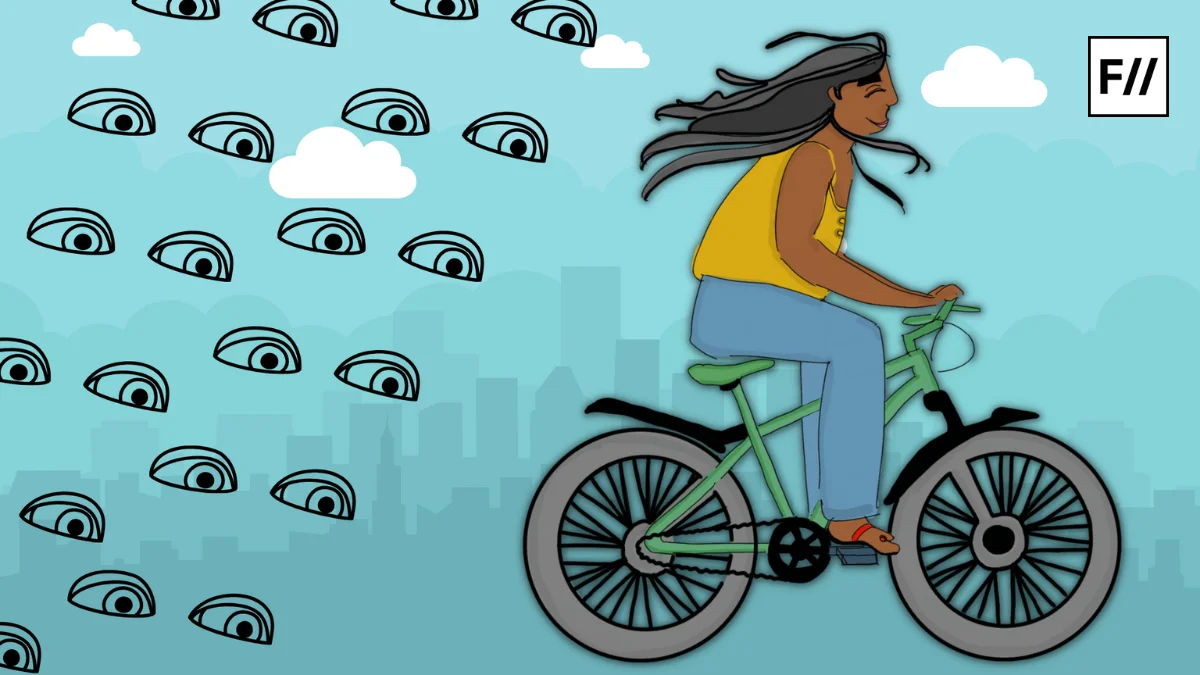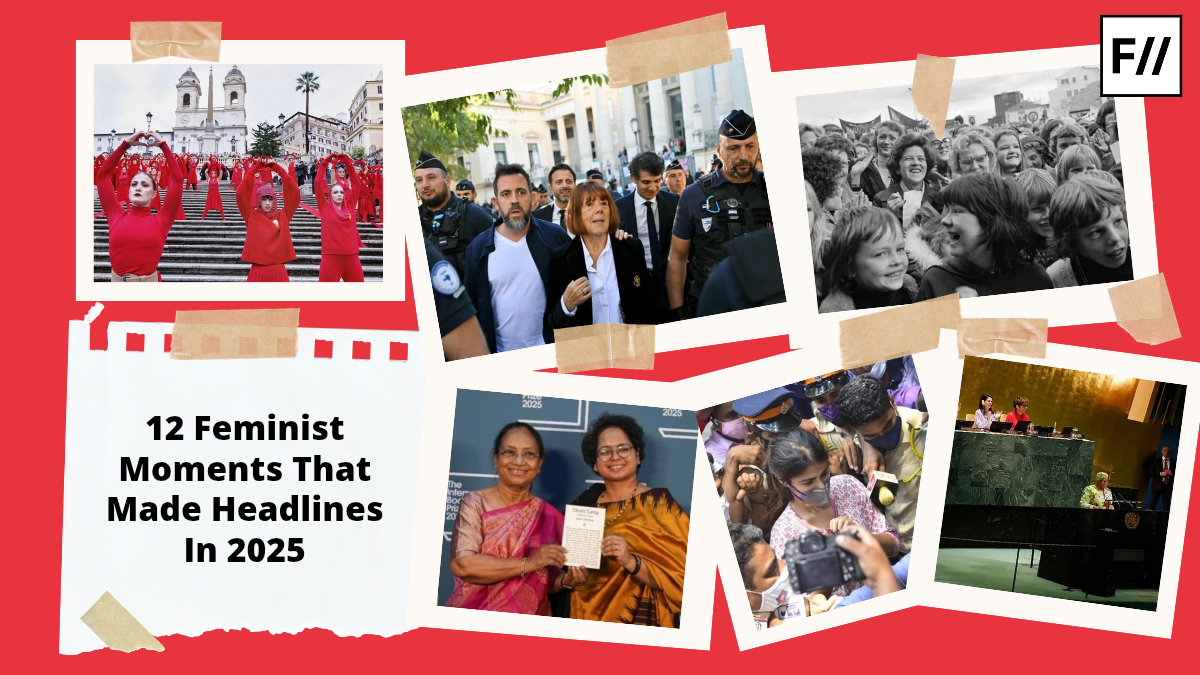Posted by Sargam Sharma
“Split the room, haven’t I?”
For days after watching Hannah Gadsby’s Nanette which has now gained cult status, I tinkered with the idea of writing about it. I started an essay titled “Where Do the Quiet Gays Go?” I researched the history of women comics almost defensively, as if I had to prove that Gadsby was the rule with my people, not an anomaly. I discussed the West’s obsession with ‘brave’ coming out stories, and whether coming out held the same value for those of us in the Global South.
Soon after, every major publication had their own take, their own editorial on Nanette. As is the ritual with modern liberal media, everyone had to have a say. Don’t get me wrong, this Guardian piece, for example, made me tear up at every paragraph. Now though, with the novelty of writing on Nanette taken away, I gave up on the idea. But I didn’t stop thinking about Nanette.
It’s not like I hadn’t seen powerful female performers before. But there is something to be said about a woman who builds herself as the ‘funny one’ and then chooses to abandon it for the ‘angry one’. Especially when the business of being funny is a man’s job. Ironically so, when they are not even funny.
Humour is an esoteric form of human communication. It is an expression of culture, politics, and power relations. It takes an extremely keen eye to tease out the subtleties of our world, and expertise with language to deliver the observation. It requires a mastery that deserves to be celebrated. For small creatures such as we, there is nothing like a good joke. At times I can remember the exact thing I was laughing about when I realised I was falling in love with someone.
It seems the business of being funny is a man’s job. Ironically so, when they are not even funny.
Everyone is capable of humour, that’s the thing – we all laugh at jokes, we all crack them. But here’s the problem: men laugh at rape jokes and sandwich jokes and “You’re so gay” jokes, and “She is so ugly” jokes. Are these jokes examples of a keen sense of observation, of an expert use of language that needs to be celebrated? Or is it the impunity that men enjoy that has them cackling?
It is one thing to hurt someone, quite another to laugh at them. Coming from someone who stands above you in the hierarchy that structures our worlds, it is not humour; it is jeering. It comes from a place informed by resentment and insecurity. To laugh at someone from a pedestal pointing downwards is necessarily dehumanising. It shows that you not only committed the crime, but you got away with it. It helps maintain that pedestal. I know men call us feminists “sissy” when we get upset over their jokes, but they say this to prevent a bigger upsetting. An upset in the power that was bequeathed to them by the happy ‘accident’ of patriarchy.
The powers that allow men to pass off unthoughtful platitudes as humour. With a heady mixture of misplaced confidence and riding on stereotypes, you can create the illusion that you are funny. Take the Monica Lewinsky jokes for example. For those of you who don’t know, Monica Lewinsky was a 20-year-old woman that Bill Clinton had oral sex with when he was the President and she, his intern. He completed his second term and left office with the highest approval rating since World War II. She, on the other hand, was immortalised as the chubby office slut.
It fits into all the sexist tropes of the time. It was easy to demonise her, Otherise her, make ourselves feel better. She was the easiest punch line. Especially so because it was straight white men making the jokes. You know who an easy punch line in India is? Mayawati. The Bahujan ex-CM of Uttar Pradesh is one of the strongest voices in the fight for social justice in Indian Politics. However, she is regularly ridiculed for her manner of speaking, for her unfeminine ways. The forces that we try to disregard her are based on preconceived notions that have nothing to do with her politics.
Also read: Hannah Gadsby’s ‘Nanette’ Is Feminist Rage Against Comedy
Some video footage recently surfaced of Trevor Noah’s 2013 Australia Tour. In it, he calls Aboriginal women ugly. He commodifies them while also making fun of an aboriginal ritual item, as a mostly white crowd is seen laughing. It is exceptionally shocking because Noah, who lived in apartheid South Africa as a child, usually tended to bring a level of sensitivity and nuances unprecedented in American late night humour.
He has a special vantage point as a man of colour in a white supremacist state. And yet, he participated in the dehumanisation of women of colour because he was simply playing to the audience of the room. He knew how to earn those laughs in that particular crowd. He wasn’t being funny.
To laugh at someone from a pedestal pointing downwards is necessarily dehumanising as it helps maintain that pedestal.
We follow the same script over and over again. The Indian comedy scene is dominated by comics (both men and women) who thrive on copying accents and deliberately mispronouncing English words. Most often these are accents that are associated with working-class or lower caste people. They do so while sitting in the liberal bastion of comedy enclaves. We find it very funny because we are learning what not to be. We are learning that the way we pronounce our ‘sh’ sound can determine our seat at the table. When someone makes a grammatical mistake and we laugh at them, we are thinking, “Oh I am not like this”. It’s a cheap but ephemeral source of pleasure.
Jokes that make fun of those who can’t speak English, or those who try and fail, by those who enjoy the privilege of being fluent in the language are nothing but a signifier of power – is to Otherise. It is to solidify our in-groups of affluence. It is to keep out those who are being ridiculed so that we can make money at their expense. If this is humour, I am happy being ‘a killjoy angry feminist’. It is this celebration of sexist and casteist tropes that have created assumptions about what is and what is not funny. To break away from these tropes perhaps means that comedy as we know it will lose its essence. Hannah has shown us that it is not just necessary, but also possible.
Also read: “It’s Only A Joke!” Language Matters, So Be A Buzzkill!
It’s not just the comic stage that is riddled with these problems. We experience it intimately. It is the fear of being ridiculed that Trumps up (pardon the pun) toxic masculinity. Jokes that tag men as ‘gay’ or ‘woman’ for acts that are not masculine, make them chisel away the tenderness and kindness inside of them, the resulting violence of which wreaks havoc both in their lives and ours.
Shame is a very powerful weapon. When you soak men in shame for not being ‘man enough’, they try their best to outrun this shame. They grab and they grope their way to the keys to the kingdom we like to call gender. Because those are the rules. The only rules. Violence is the only way you get ahead in the ‘un-winnable’ hand in the game of gender. For as long as humour weaponises shame, this will be the consequence. And it will never, ever be funny.
If this is humour, I am happy being ‘a killjoy angry feminist’.
And this is what I mean when I say men are not funny. Have I never laughed at a joke cracked by a man? Of course, I have. But humour as we currently know it is riddled with unquestioned notions of power. Everyone who partakes in it is guilty of it in some measure, but for men this is especially so because they benefit from the existing structure. Brilliant and funny women in our lives are never known for their humour, but the sexist prick in your college group is remembered as the ‘funny one’.
So yes, men are not funny. They have mastered the rules of their creation. They have played a political game of prejudice and stereotypes. To call out men is not just an attack, it is a sincere, informed imploring to examine notions that we take for granted. If one is truly invested in the task of being better, one would look beyond this attack and try and grapple with the deeper questions being asked. Is it only men who crack these jokes? No, we have all internalised these notions, but men benefit from them at our collective expense.
“So then do you just hate men?” – I imagine that by this point in the article, the crowd that would ask this question has been filtered out.
When I say ‘a happy accident of patriarchy’, let it not imply a lack of deliberation. I say accident to mean that it is merely accidental that men have come to inherit this world – they didn’t earn it. But to keep this world in their hands requires a deliberate, conscious effort. Therefore, not only do they need to reinforce the notions that keep us in our place, but they also must create the myth that women either can’t take a joke, or they are just not funny.
Is it only men who crack these jokes? No, we have all internalised these notions, but men benefit from them at our collective expense.
Women are endlessly funny. We have to be. We live in a world not meant for us. If we didn’t laugh about it, it would become unliveable. Women’s folk songs in Rajasthan are filled with jokes about inept husbands and scandalous sexual fantasies. My Instagram feed is a curated list of illustrious women taking shots at every man who has asked them what toxic masculinity means when they could just Google it. I categorise my close female friends based on what kind of memes they like (I will always send you every doge meme I come across Anushka, I promise). Humour can make one feel treasured, anchored. We need to feel like we are part of something to thrive in this unkind world. Laughter binds as not much else can. I have learnt that from the women in my life.
Also read: India’s Female Comedians Are A Badass And Much-Needed Counter To Sexist Humour
Don’t buy this myth that funny is not for you. “No one makes me laugh like he does” is no reason to stay with him. You allowed him the incomparable privilege of access to your life, and he is mining that in exchange for unreturned emotional labour. My bet is that you suppressed that witty comment to let him have his moment. Stop being an agent of your oppression. Make that pun, make it again. He may have set the rules of the game, but Hannah showed us that the rules are old and arbitrary and flesh vases for his dick flowers.
When something truly profound comes your way, give yourself some time and either write about it or laugh about it.
Sargam is a recent Sociology postgraduate and forever finger-tip activist. Apart from napping and being grumpy all the time, she also enjoys having an opinion on everything. Follow her on Twitter and Instagram.
Featured Image Source: We Love So Lo
About the author(s)
Guest Writers are writers who occasionally write on FII.




